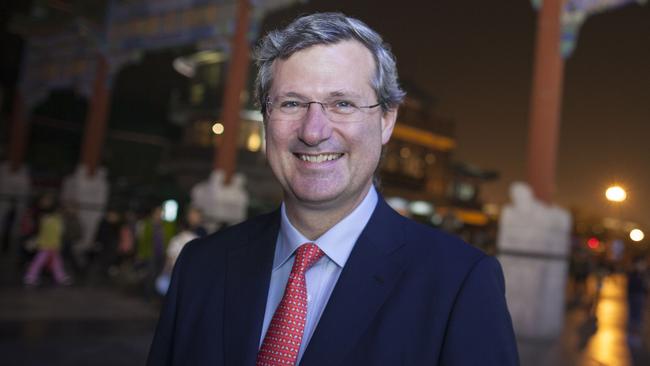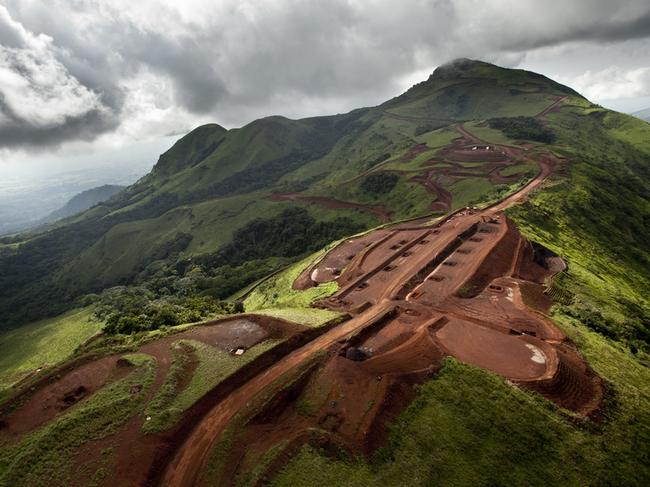Rio Tinto’s Alan Davies suspended over Simandou payment
Rio’s energy chief has been suspended and a legal head has quit over a $13.5m payment to a consultant in Guinea.

A top Rio Tinto executive has been suspended and another forced out of the company after revelations of an unusual payment to a consultant in Guinea.
In a brief statement, Rio Tinto (RIO) said it recently became aware of emails from 2011 that revealed contractual payments of $US10.5 million ($13.5m) to a consultant providing advisory services on the Simandou iron ore project.
The miner said it had suspended energy and minerals boss Alan Davies in response, while its head of legal affairs, Debra Valentine, had stepped down.
It is understood Rio has notified the Department of Justice and the Securities and Exchanges Commission in the US, the Serious Fraud Office in Britain and ASIC in Australia.
Given the breadth of authorities that have been notified, it is thought the contractor, the identity of who is not yet known, has links to government.
It is thought Mr Davies and Ms Valentine were part of the email chain, which was understood to have been revealed on a public website, before being taken down.
The name of the website is not known, but is understood to not have been WikiLeaks.
This sparked an internal Rio investigation on August 29, which has now uncovered enough information to be taken to authorities and stand down Mr Davies and Ms Valentine.
“Energy & Minerals chief executive Alan Davies, who had accountability for the Simandou project in 2011, has been suspended with immediate effect,” the miner said.
“Legal & Regulatory Affairs group executive Debra Valentine, having previously notified the company of her intention to retire on May 1, 2017, has stepped down from her role.”
The two executives formed part of Rio Tinto’s 10-person executive committee.
Mr Davies, a 20-year veteran at Rio and longest-serving member of the executive committee, was only promoted to the top role in energy and minerals this year after a shake-up of the group’s operations.
The enlarged role built on his ascension to the leadership role of the diamonds and minerals unit in 2012, which came after he led the group’s international iron ore operations.
He is also a member of Rio Tinto’s ethics committee.
Before joining Rio Tinto, Mr Davies worked at Coopers & Lybrand in Brisbane (now PricewaterhouseCoopers). He is an accountant (Queensland University and lawyer (Queensland University of Technology and University of Sydney).
Ms Valentine joined the miner in 2008 and assumed her role as head of legal and regulatory affairs in 2009.
The two executives were among the highest-paid in Australia last year, with Mr Davies’ remuneration totalling £2.1 million and Ms Valentine taking home $US2.9 million.
At the end of Rio Tinto’s financial year the figures had the Australian dollar equivalents of $4.2m and $3.9m respectively.
Rio Tinto said it would “co-operate fully” with authorities on the matter.
“Further comment at this time is … not appropriate,” the company added.
It was on Good Friday in April 2011 that Rio Tinto revealed it would pay $US700 million to the Guinean government to secure development rights to the Simandou project.
The deal was reported to have been struck with the help of US multibillionaire investor George Soros, who had been called in by Guinea’s new government earlier in the year for advice on a new mining code, as well as ways to stamp out corruption.
“Guinea is currently experiencing a new era,’’ Mr Soros said at the time. “Its natural resources have in the past not been used to benefit the people. Guinea now has an opportunity to change this.”
The payment was described as a “settlement” payment by Rio for its indecision in its rate of expenditure at Simandou, caused by the September 2008 onset of the global financial crisis.
Rio acknowledged in February 2011 that it was under pressure to convince the Guinean government it should be allowed to retain its stake in a half-share of the Simandou deposit.
Rio’s fears of losing out altogether on Simandou began in 2008. Guinea’s then military government transferred half of Rio’s coverage in the deposit to an Israeli diamond dealer, BSGR Group, because Rio had missed investment deadlines.
Brazil’s Vale then cut itself into Simandou when it paid $US2.5 billion for a 51 per cent interest in the BSGR side of Simandou, later the subject of of unsuccessful challenge by Rio.
The new development comes just two weeks after Rio offloaded its entire stake in Simandou to its Chinese partner Chinalco, in return for a promise of a $US1 billion payment if it gets developed.

Shares in Rio were underperforming against its peer BHP in the wake of the news, but still moved up 1 per cent to $55.36 at 10.30am (AEDT).
BHP shares had moved up 2 per cent, as investors eyed a sharp rise in commodity prices overnight.
RBC Capital Markets analyst Paul Hissey said the issue would likely not be material to the miner’s financials.
“Given the scale of Rio Tinto, it would appear unlikely that this development would have a material impact from a monetary perspective, though we will have to see if anything eventuates from this in the future,” he said.
“Rather, this is a potentially negative public relations issue which Rio Tinto has managed to avoid whilst BHP has been dealing with the Samarco dam incident.”
With Barry Fitzgerald

